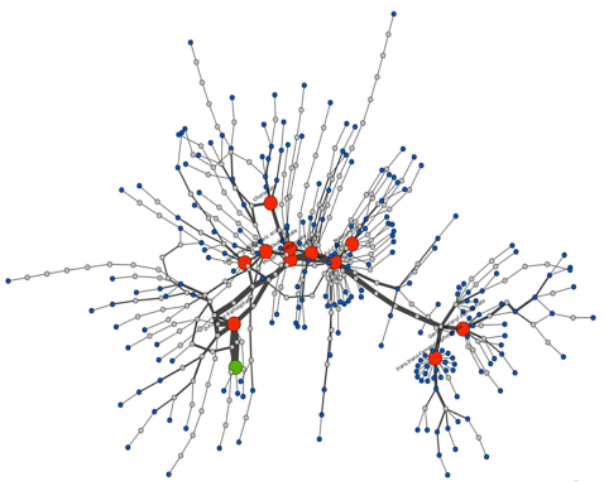
Disability Pride Month: Removing Barriers and Amplifying Voices
learn more

Image: Metabolic paths between sugar (green circle) and the platform nodes (red circles) that serve as launching points for the ~400 molecules (small white and blue circles) derived from them.
As anyone in product development – regardless of industry – will tell you, it takes significant time, financing, and patience to successfully bring a new product to market. Considering the resources required, it seems obvious that businesses would leverage and repurpose as much as possible for future product development – but with bio-based products, deep forethought and technical expertise are required.
When engineering biology, the process for developing a target molecule can take upward of years, so scientists developed platform strains – one strain that with a few tweaks can produce several target molecules that are biologically related. In the same way that the chassis brought great efficiency to the automotive industry, the development of platform strains has resulted in significant productivity gains and a much stronger return on investment (ROI) on the scientific R&D required to bring a bio-based product to market.
Platform strains are a long-standing part of Amyris’ R&D strategy to accelerate timelines, reduce the cost and time to market, and increase the likelihood of technical success. The concept was first established in 2012 when Amyris’ R&D team was tackling some of its early molecules in fragrance. Rather than develop an entirely new strain for each fragrance molecule, Amyris scientists engineered the DNA in such a way that the strain could be switched, for example, from patchouli to santalols in a single step. The success in the fragrance molecules was so significant that it set Amyris down a path to invest in building out a number of platform strains that can easily be re-engineered for diverse molecule production.
When working under immense business pressures to develop a bio-based product on a certain timeline, taking the additional time to engineer a strain so it can be used for multiple purposes is, understandably, not always top of mind. The most critical aspect to developing a platform strain is planning ahead to account for the additional engineering required and anticipating a longer timeline for the first molecule. Businesses can quickly make this investment back – and several fold – with each subsequent molecule that uses the platform strain, but it requires technical and market maturity that many in the industry cannot yet afford.
Recently at the Biochemical and Molecular Engineering XXII conference in Cancún, Mexico, Dr. Dmitry Grapov, Amyris Senior Director of Data Science, spoke about his team’s work to accelerate the Design Build Test Learn (DBTL) cycle using machine learning and artificial intelligence. Amyris was one of only a few companies in attendance with proven capability to carry out fermentation-based production at industrial scale.
“As new tools and technologies for engineering biology have advanced and improved, the potential of biotechnology has rapidly grown. Today, biotech is seen as a leading technology for solving global problems, ranging from climate change to pharmaceuticals to consumer goods,” said Dr. Dmitry Grapov, Amyris Senior Director of Data Science. “This year’s conference brought together a wide range of disciplines and showcased some of the industry’s most inspiring examples of biological engineering’s impact.”
Amyris’ innovation and continued investment in R&D, specifically platform strains, have been essential to the company’s success. Currently, 11 of Amyris’ 13 commercialized manufacturing strains have been derived from a platform strain. By leveraging a platform strain, Amyris has greatly improved the ROI on initial strain development and has even driven new market opportunities – in clean beauty, health and wellness, and more – by identifying technical possibilities that wouldn’t have otherwise been pursued.
Amyris’ investment and ambition led to a fundamental technology that has and will continue to be invaluable in its R&D pipeline and market success. Learn more about Amyris’ science and technology and follow along on Twitter and LinkedIn.
###